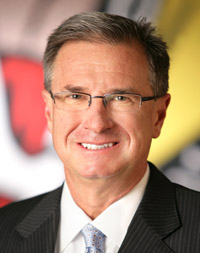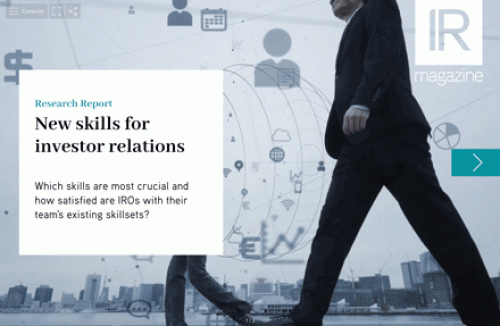Ron Slaymaker leaves semiconductor manufacturer’s IR team after 16 years
Ron Slaymaker, head of IR at Texas Instruments (TI), is to retire from his role at the US semiconductor company after 16 years in investor relations.
After making the announcement during the company’s July earnings call, Slaymaker also revealed that Dave Pahl will take over as IR director, and has been elected by the company’s board to the position of vice president. The outgoing IR head signed off by passing on words of advice from generations of TI managers: ‘Please don’t screw it up’.
Slaymaker, who is a member of NIRI, moved into TI’s IR team in 1998 following several years at the Dallas company in engineering, sales, marketing, and management roles. He recently led his IR team to finish seventh in the IR Magazine US Top 100 standings.
IR Magazine briefly spoke with him to find out how IR has changed throughout his career, and how he plans to spend his time off.
How did you first come to join the team at TI?

Ron Slaymaker has been part of Texas Instruments' IR Team for 16 years
I joined TI directly after my undergraduate studies at Georgia Tech; my degree was in electrical engineering and TI was a natural fit. In addition, I had an interest in continuing my studies to pursue an MBA degree and TI made the career decision easy by offering me a job as a design engineer in Chicago and agreeing to cover the cost of my studies at the University of Chicago. Compared with the alternative of trying to pay for an expensive graduate school education while missing out on a couple of years’ salary in the process – let’s just say it was a no-brainer.
Has the function and purpose of IR changed since you joined TI’s team?
In the early years, the phones were a lot busier and a lot of our efforts were directed toward the sell side. Many of the questions we were fielding were strictly short term in nature and those investors weren’t really the kind we focus our energies on today. Now we give guidance once a quarter and then provide no additional updates or color on near-term business conditions until we report the next quarter three months later. This eliminates many of the calls and frees up our time for more proactive outreach to targeted investors, many being generalists that we believe could have interest in owning our company for the long term.
It’s a much more productive use of IR time and, I’m convinced, produces significantly more valuable results for the company. The proactivity of our work also sends a clear message to investors that they are important to TI. In the end, it’s about the direct relationship with shareholders ‒ the sell side is important to help us reach and communicate with our investors, but it is not our primary audience.
What’s been the biggest challenge you and your team overcame in your time at TI?
Learning to do ‘addition by subtraction’. Much of TI’s market capitalization increases through the years have been the result of divesting less valuable businesses to allow the company to focus on core businesses that provide the opportunity to generate significant long-term returns. Over time, we’ve divested a defense electronics business, a PC business, printers, enterprise software and commodity memory chips. By far the most challenging, however, was getting out of wireless – custom chips for mobile handsets – where we were the market leader at a time many competitors and investors were convinced those trees really could grow to the sky.
What changes or introductions to the company’s IR program are you particularly proud of?
Besides refocusing our energies on investors that share our long-term vision, I’m proud of filling our IR program with individuals who have deep and broad experiences inside the company. Both my successor and I measure our company tenure in decades, including experience in design engineering, applications engineering, sales and strategic marketing. We’ve each run businesses at the company, which means that IR isn’t simply a communications conduit to executive management for us. We’re members of the company’s strategy leadership team and are, therefore, in the company’s inner circle.
I believe investors quickly realize that a discussion with TI’s IR is as informative as discussions with most TI executives. Of course, having our executives meet with key investors is still important as we want them to personally know our managers, but IR can get the ball 80 percent down the field before we need to involve our CEO or CFO.
What plans do you have for your retirement?
I’d like to learn how to relax and slow the pace down a bit. I plan to travel a lot with my wife, who is retiring at the same time from her career as a physician. While I love investors, it will be great to have my future trips to Europe be more leisurely than a frenetic pace of half-day skips across multiple cities, presenting and doing meetings while jet-lagged the entire time. I also have some new toys I’m looking forward to playing with.
Someone recently told me IROs don’t really retire, they just consult. We’ll see about that – I’m convinced it’ll be good.










